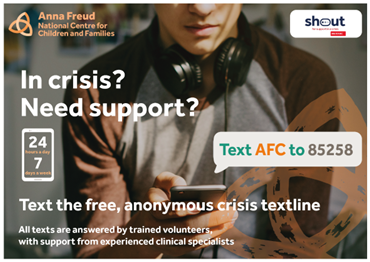What is Mental Health?
Everyone at St Cecilia’s has an important role to play in supporting the wellbeing and mental health of our community.
We offer pastoral care throughout the school to support our pupils and staff to develop effective coping skills and resilience. We support our pupils and staff and help them build positive relationships both in our school community and out in the community and within their family units. Within school we work closely with Heads of years/form tutors/teachers/parents and carers, as well as external agencies constantly ensuring our pupils get the correct support package for their individual needs. Our dedicated team, work with pupils on a one-to-one basis or in small groups to raise aspirations and ensure all our pupils can reach their full potential. Our pupils’ safety and emotional wellbeing is paramount. We want to help our students to come to school to achieve and will endeavour to help them get the most out of school.
Some of the areas we can offer support with are:
- Emotional Literacy (ELSA)
- Cognitive Behavioural Therapies (Compass Bloom)
- Counselling
- Drawing and Talking
- Exam Anxiety Workshops
- Male Mental Health Workshop
- LGBTQ+ Wellbeing workshop
- Bereavement Counselling
- Kindness Workshops
- Self Esteem Workshops
- Sleep Hygeine Workshops
Compass Bloom
Compass Bloom working together to support young people, families, and staff at St. Cecilia’s
Who are we? We are a mental health support team that provides confidential emotional health and wellbeing support to over 80 allocated schools in the Chorley, South Ribble, West Lancs and Preston localities. Our lovely Education Mental Health Practitioners work in schools to provide direct 1:1, and group work with children and young people experiencing mild to moderate mental health needs. Compass Bloom is a low intensity intervention service aimed at supporting children and young people ‘grow through what they are going through.”
What do we do?
-Provide 1:1 CBT informed, evidence-based sessions for low level mental health needs.
-Work with groups on worry management /low mood.
-Deliver workshops to small groups of up to 10 pupils on self-esteem, sleep, transition, and managing emotions.
-Deliver assemblies and whole school approach activities to support both staff and pupils.
-Help children and young people get the right support at the right time, e.g. signposting to services
-Work directly with parents to manage worry and behaviour with children.
What to do next? If you feel that your child may benefit from early intervention support, please contact Miss J Hughes (jh@st-cecilias.lancs.sch.uk )
For further information, please scan the QR code below.

Student led mental health and wellbeing activities
We have a mental health ambassador who co-ordinates our pupil wellbeing champions, and we have recently achieved the Gold Standard school impact award certificate. We have various events throughout the year highlighted key dates in the school calendar focusing on mental health and wellbeing.
Anger
How to deal with Anger:
Where do parents go to get help for angry teenagers:
Anxiety
What is anxiety?
Managing anxiety strategies
Support for parents with anxious children
Child in Mind: what do we know about childhood anxiety and what can parents do about it?
Nip In The Bud
Eating disorders and Body Image
Eating disorders are another form of self-harm. This is not gender specific, but it is well known that more these females than males use these behaviours to resolve their issues with lack of self-confidence, low self-esteem or managing the pressure from peers over their self-image.
- What are eating disorders?
“An eating disorder is a mental health condition where you use the control of food to cope with feelings and other situations.”
Source: https://www.nhs.uk/mental-health/feelings-symptoms-behaviours/behaviours/eating-disorders/overview/
Eating disorders mostly affect teenagers between the ages of 13 and 17, although we understand anyone can assume a negative relationship with food and eating. With treatments and early intervention most people can recover from an eating disorder.
Difference types and most common forms of eating disorders are:
- Anorexia Nervosa – trying to control your weight by not eating enough food, exercising too much or doing both.
- Bulimia – losing control over how much you eat, then taking dramatic action to prevent gaining weight i.e. vomiting or taking laxatives.
- Binge eating disorder (BED) - eating large quantities of food until you feel uncomfortable and then compensating by having long periods of eating very little.
Managing eating disorders resources
Support for parents with children with potential eating disorders
Caring for someone with an eating disorder?
Child In Mind: what do we know about eating disorders and how to cope?
Emotion Based School Avoidance (EBSA)
Emotional Based School Avoidance (EBSA) is a broad umbrella term used to describe a group of children and young people who have severe difficulty in attending school due to emotional factors, often resulting in prolonged absences from school. The impact of EBSA on young people and schools is far reaching.
What are the signs of EBSA?
Your child may show any of the following signs of EBSA:
- Be fearful, anxious, or angry when faced with the prospect of school.
- They may avoid getting ready for school and become upset during their morning routine on a weekday.
- They may complain of physical illness: headache, tummy ache, feeling sick.
- They may share anxiety symptoms such as a racing heart, sweating, fast breathing or pins and needles.
These symptoms may be present mostly during the week or on a Sunday evening when they know they are going to school the day after. They may not show these signs at weekends or during school holidays. Where a child has been finding attending school difficult for a long period of time, they may no longer be attending school, have difficulty sleeping, have isolated themselves from friends or have a fear of leaving the house at all. This highlights the need for support to be put in place sooner rather than later.
https://www.lancashire.gov.uk/media/947645/lancashire-ebsa-parental-guidance.pdf
General support
Kooth

Kooth Resources
Text Messaging Services
If face-to-face counselling is not appropriate for you, there are text services available. The numbers to access these services are as follows:
The Wellbeing and Mental Health Service: Free Helpline: 0800 915 4640 or text HELLO to 07860 022846
Young Minds Crisis Messenger text service: text YM to 85258
Childline
You can still start a 1-2-1 chat from 9am - 10:30pm. Or you can call 0800 1111 for free from 9am - 3:30am. You can also send an email using a Childline account any time.
Chat Health

Self-referral
The following links direct you to self-referral forms that can be completed without the input of a GP or educational professional:
CAHMS-Lancashire
https://www.healthyyoungmindslsc.co.uk/home/central-lancashire-camhs-self-referral
Minds Matter (age 16+)
https://gateway.mayden.co.uk/referral-v2/07681012-dcbe-4194-acf6-e09a9ce2929d
Student and Family toolbox
Self-harm
- Why do people self-harm?
- Support for students at risk of self-harm
- Support for parents with children at risk of self harm
Distractions From Self Harm
Calm Harm
Self-esteem and confidence
Self-esteem and self-confidence are how we label our feelings about ourselves.
How do you know when their self-esteem is low? Where do parents go to get help?
Parents A-Z Mental Health Guide
Support for students with low self-esteem:
Suicide


Coping with suicidal feelings support
Suicide safety plan
Suicide Safety Plan
Support for parents of children with suicidal thoughts
How To Support Someone Who Feels Suicidal
Suicide safety plan
Suicide Safety Plan
Support for parents of children with suicidal thoughts
How To Support Someone Who Feels Suicidal
Trauma
The UK Trauma Council defines trauma as 'a distressing event or events that are so extreme or intense that they overwhelm a person's ability to cope, resulting in lasting negative impact’.
Trauma can include events where you feel:
- Frightened
- Under threat
- Humiliated
- Rejected
- Abandoned
- Invalidated, for example your feelings or views have been dismissed or denied
- Unsafe
- Unsupported
- Trapped
- Ashamed
- Powerless
Ways trauma can happen include:
- One-off or ongoing events
- Being directly harmed or neglected
- Witnessing harm to someone else
- Living in a traumatic atmosphere
- Being affected by trauma in a family or community, including trauma that has happened before you were born.
Where To Go To Get Help
Always visit your GP in the first instance. After assessment of level of need, a GP may offer medication or therapy as a treatment.
Usual therapies offer are Talking Therapy or CBT.
Bereavement
The loss of a someone who is close to us is difficult for all to deal with, but with children there is the added complexity of not understanding why this special person has left them. It is important that when the time is right, a steady and regular routine is established as soon as possible. However, all elements of the support network should be aware that it can take many months before the young person starts to accept the change in their life. A sense of bereavement can also come from separation from important individuals in a child’s life. The therapies and treatment for this can be similar.
There are many support networks available to both the child and the family. Here are a few which offer advice and guidance or contact details of specialist bereavement specialists.
.JPG)